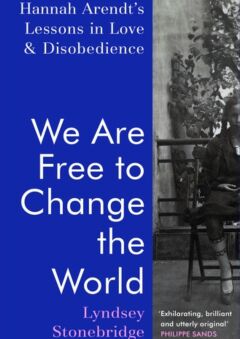In these challenging times Hannah Arendt's writings offer us guidance and encouragement.
Review of: We Are Free to Change the World
Author: Lyndsey Stonebridge
Reviewed by David Towell
Hannah Arendt was born into a Jewish family in Hannover in 1906. She died in the United States in 1975, leaving Germany in 1933 and escaping from persecution, via France and Portugal in 1941. Her own life is a testimony to the disastrous period in European history that grossly disfigured many of these years. Trained in philosophy, she became a leading public intellectual and commentator. Among much other writing her books include The Origins of Totalitarianism (1951), The Human Condition (1958), On Revolution (1963) and Eichmann in Jerusalem: A Report on the Banality of Evil (also 1963).

Stonebridge has produced a masterly account of the connections between Arendt's biography and scholarship, herself retracing many facets of Arendt's life. This book reads like a novel but centres around a perceptive and critical analysis of Arendt's ideas. It is a timely publication because, as Arendt herself anticipated 50 years ago, the disasters of the last Century were not vanquished by the defeat of fascism. Indeed we are busy creating our own disasters, especially but not only through our apparent blindness to the massive impacts of the climate catastrophe. Hence the importance of Arendt's message in the title of Stonebridge's book: more fully, 'We are free to change the world and start something new in it' (Crises of the Republic, 1972).
Arendt's Ph.D. was a study of the idea of love in the work of St. Augustine. She continued to emphasise that it is capacity for love that makes us truly human. But all around her, the storm clouds that would drive her into exile were gathering and so shaping her important work on what became The Origins of Totalitarianism. Typically totalitarian regimes are both nationalistic and racist as well as authoritarian. The German version, of course, majored on anti-semitism. Arendt understood well that this had deep roots. Anyone who visits the Jewish Museum in Berlin will be able to follow the emergence of anti-semitic thinking, knowing now where this ends, back to the 14th Century. But Arendt also notes how the typically racist and controlling strategies of the colonial powers spun back to Europe to reinforce what became barbarism closer to home.
She argues that demagogues step into the gaps left by failures in democracy and, in a passage of contemporary significance, she suggests that the ideal subjects for the spread of totalitarianism are not the political militants, but rather people for whom the distinctions between fact and fiction, truth and falsehood have dissolved. She anticipated 'post-truth' politics although perhaps not the so-called 'social media' that now permeate all our lives and greatly expand the spread of conspiratorial thinking.
In Origins, but more fully in The Human Condition, Arendt seeks to offer us a prescription for both challenging these trends and playing our part in collective efforts to create a better world. There are three main lessons that I would highlight.
Arendt spent her youthful scholarship in Konnigsberg, where Kant had also lived and developed his philosophy of reason,150 years earlier. Following Kant, she emphasised that the thinking self is the first defence against tyranny: it is where morality begins. The thinking self seeks to avoid dogma and stay true to the perplexities of reality. Later, Vaclav Havel's essays about totalitarianism of the Communist variety were published under the title Living in Truth.
Thinking can be a solitary activity, but exercising freedom requires the participation of others with different perspectives so that we can test our sense of reality against their views and experiences. Also later, Amartya Sen argues similarly for the importance of 'public reasoning' in The Idea Of Justice.
And, of course, faced with the huge challenges of her age and ours, we cannot be bystanders. Moral behaviour requires that we become activists. Putin rules in Russia, Trump may return in the USA, far right leaders get elected in European democracies, the planet burns and those of us with television can watch in real time the destruction of Gaza and its people. Responding to Stonebridge's title, We Are Free To Change the World, we need to decide together that 'Yes we can!'
The publisher is Jonathan Cape.
We are Free to Change the World © Lyndsey Stonebridge 2024
Review: Hannah Arendt's Lessons in Love and Disobedience © David Towell 2024
community, social justice, England, Reviews